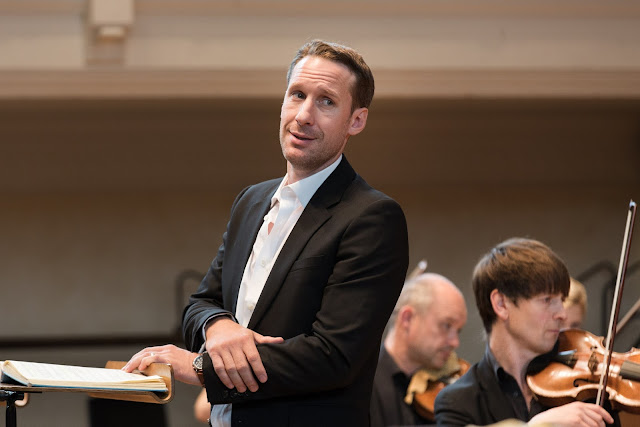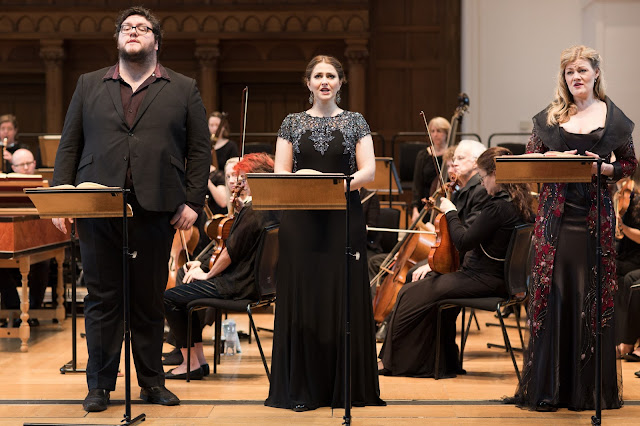 |
| Jacques Imbrailo - Don Giovanni - Classical Opera photo Benjamin Ealovega |
Reviewed by Robert Hugill on Jun 17 2016
Star rating:
A sense of propulsive drama in Ian Page's account of Mozart's original version showcasing the impish charm of Jacques Imbrailo's Don
 |
| David Soar - Don Giovanni Classical Opera - photo Benjamin Ealovega |
The version used was Mozart's original Prague version from 1787, which gives us the composers first thoughts, so no Dalla sua pace, no Mi tradi and no Leporello and Zerlina duet (which is hardly ever done) all of which were written for the Vienna performance in 1788. When I interviewed Ian Page last year (see my interview on this blog) he talked about how his instinct was usually to perform the original version and, when recording, relegate the subsequent changes to an appendix. So we must wait for the recording to hear Dalla sua pace and Mi tradi.
Another point Ian made in the interview was the importance of recitative and devoting enough rehearsal time to it. It was clear that this was true of Don Giovanni as the recitative was full of character and colour, and at no point did it simply chug along. Instead, the singers all brought the drama vividly to life within the text. Though this was a concert performance with the singers using scores, there was a sense of dialogue and drama between the characters; the recitative involved characters interacting, and where the drama called for it arias were sung to someone, never to thin air.
The sense of colour and drama started from the opening notes of the overture. Never has Mozart's writing here sounded so remarkable; it is not so much that Ian Page pushed the music, though speeds were quite brisk, but instead he encouraged the players to explore the full range of timbres and colours available to the period instruments. There was a vividness and unvarnished directness to the music which made it remarkable.
Jacques Imbrailo sang the title role, a role that he first sang in 2013 for production directed by Sir Thomas Allen at Scottish Opera. He made a suave and charming Don, singing quite lightly with a superb sense of character. He brought a lovely charm to the serenade (when leader Matthew Truscott enterprisingly swapped his violin for a mandolin), and was a vivid torrent of words in the champagne aria. Though here the fact that he sang lightly meant that the balance with the orchestra was not ideal.
This was a Don Giovanni who real does respond to each of the different characters in kind, being the chameleon that he is. And Imbrailo was full of character in the recitative, and it was here that he created a full idea of the Don and brought out his charmingly casual attitude. Imbrailo's Don really was someone you would forgive anything, with a remarkable range of facial expressions and an impishly sexy charm.
 |
| Stuart Jackson, Ana Maria Labin, Helen Sherman - Don Giovanni Classical Opera - photo Benjamin Ealovega |
We had contrast too between the voices of Don Giovanni's women. Soprano Ana Maria Labin was Donna Anna, mezzo-soprano Helen Sherman was Elvira, and lyric soprano Ellie Laugharne was Zerlina.
Ana Maria Labin is not a dramatic soprano and she counts Handel's Armida and Mozart's Konstanze in her repertoire, but she combined a lovely spinto edge with a facility for the coloratura. She also provided a remarkably focussed, dramatic intensity to the role and the moment when she made Stuart Jackson's Don Ottavio swear vengeance was quite remarkable. There were a few moments when Labin sounded a bit pressed at the top of her range, as if she was pushing too hard. But by the time we reached Non mi dir she was intense and focussed with a searing edge to her singing.
Helen Sherman made a lovely contrast, not just in terms of voice type but in the way that her Elvira was revealingly human and intensely warm. She brought a lovely lyric freedom to the role, with not hint of pressure in the upper register. Elvira is a mixed character, part comic part serious but Sherman took her completely seriously. Her Elvira was very feminine and rather vulnerable, Mi tradi was beautiful and warm, and the scene where she responds to Leporello pretending to be Don Giovanni was heartbreaking.
 |
| Ellie Laugharne, Bradley Travis - Don Giovanni - Classical Opera photo Benjamin Ealovega |
Stuart Jackson's Don Ottavio was notably for the honeyed beauty of Jackson's voice, but it was clear that Ana Maria Labin's Donna Anna wore the trousers. Jackson brought a touching suavity to Il mio tesoro, making light of the works taxing nature, and made a real sense of character in the recitative. We saw Bradley Travis as Masetto in English Touring Opera's recent performances of Don Giovanni, and it was a pleasure to encounter his fully realised account of the role, creating a fine double act with Laugharne's Zerlina.
As Ian Page included the final chorus of demons he could also have followed the original and had Masetto and the Commendatore doubled (the chorus gave the character time to change costume). Instead we had the luxury of David Shipley as quite a young looking, but wonderfully black-voiced and implacable Commendatore. The graveyard scene was thrilling, as Shipley's voice combined with the imaginative timbres and colours that Page conjured from the orchestra.
The chorus role is relatively small, but the Philharmonia Chorus made Zerlina and Masetto's friends suitably charming, whilst being dark-voice demons at the end.
Throughout, the recitative was in the hands of Pawel Siwczak (harpsichord), Luise Buchberger (cello) and Timothy Amherst (double bass) and they, combined with the singers, gave a lovely freedom to the dialogue narrative. It really did have the sense of being improvised and not studied, with the instrumentalists leaving plenty of space for the singers.
The whole, however, was presided over by Ian Page who conjured the magic from his performers. There was a sense of propulsive drama to the opera, with both orchestra and singers contributing to a feeling of drama moving onwards. This was Don Giovanni as exciting yet touching drama, vivid and intense, rather than a series of stately monuments.
Elsewhere on this blog:
- Master storytelllers: Robin Tritschler and Graham Johnson in Schubert - concert review
- Terrific celebration: Three large works by Colin Matthews - CD review
- Iconic but inconclusive: Mariella Devia at Rosenblatt Recitals - concert review
- Poetic rhetoric: Schumman's Cello Concerto - CD review
- Notes from the Asylum: Clare McCaldin in Stephen McNeff - Cd review
- Listening for silence: Steven Osborne in George Crumb and Morton Feldman - concert review
- Forty parts for forty years: Graham Ross & choir of Clare College, Cambridge in Tallis, Striggio, Swayne at Spitalfields Festival - concert review
- More than just Crucifixus: Antonio Lotti from Ben Palmer and the Orchestra of St Paul's on Dephian - Cd review
- Funny & filthy: Die Dreigroschen Oper at the National Theatre - theatre review
- Capturing hearts again: Ermonela Jaho's Zaza on disc with Opera Rara - CD review
- Richly imaginative: Mascagni's Iris at Opera Holland Park - Opera review
- Visions of lost worlds: Anne Schwanewilms on Schubert, Schreker and Korngold - CD review
- Home




.webp)

.jpg)




No comments:
Post a Comment